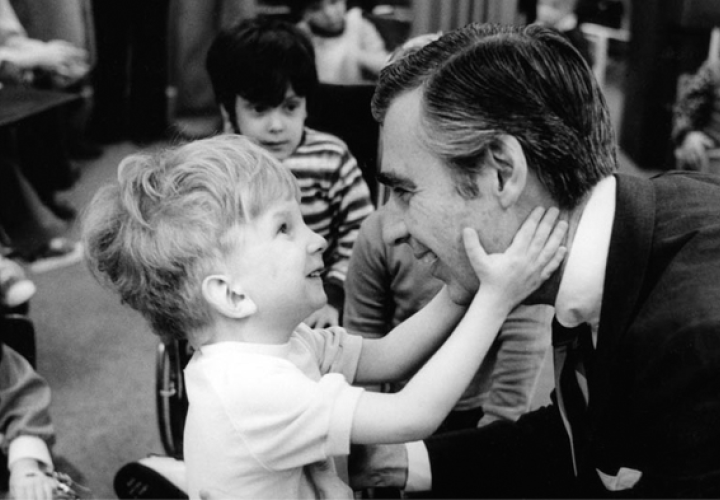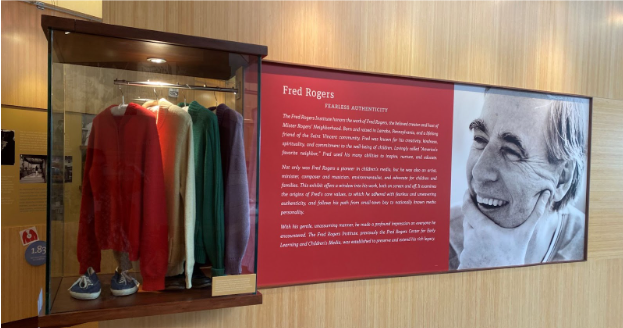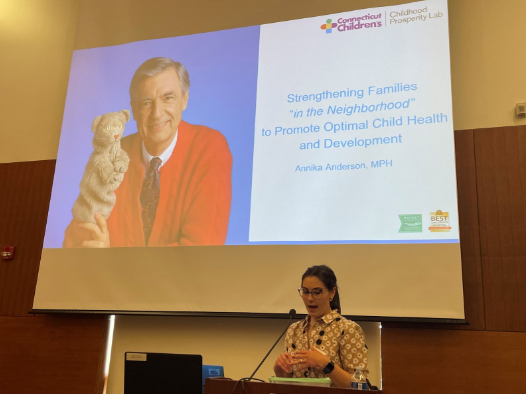Last week, I had the opportunity to present at the second annual Work of Fred Rogers conference in Latrobe, Pennsylvania - Fred Rogers’ hometown. The conference, organized by the Fred Rogers Institute, invited educators across contexts to consider how Fred’s legacy is “in action” today. Specifically, proposals for the conference were encouraged to address:
- How Fred Rogers’ work informs practice in classrooms, communities, and child- and youth-focused spaces.
- What adults can draw from Fred Rogers’ work as we seek to be children’s helpers in our world today.
The mission of the Fred Rogers Institute is to advance the legacy of Fred Rogers by investing in the strengths of families and caring adults to support the healthy development of children. The Institute’s work values relationships, belonging, families, caring adults, and childhood in its efforts to “help the helpers”.
Childhood Prosperity Lab, a program of Connecticut Children’s Office for Community Child Health, shares the Institutes' values. The Lab works to advance social innovations that are responsive to the goals, needs, and priorities of children, families, and communities, and are implemented where they live, learn, work, play, and pray. A core component of the Lab’s efforts include strengthening individual-, family-, and community-level protective factors, especially those articulated in the Strengthening Families Protective Factors Framework.
Through Mister Rogers’ Neighborhood, Fred modeled the importance of the five Strengthening Families Protective Factors (resilience; social connections; concrete support; knowledge of parenting and child development; and social emotional competence of children) and strength-based approaches. I anchored my presentation, titled “Strengthening Families ‘in the Neighborhood’”, in these facets of his legacy.
I began the session by introducing the science of “strengthening families” - inclusive of adverse/positive childhood experiences, the role of the stress response system, and strength-based theory. To connect the dots between Fred’s work and the content of the session, I incorporated the following songs and clips from the Fred Rogers Archive for participants to reflect on and enjoy:
- Lyrics of Pretending, written and sung by Mister Rogers.
- Lyrics of You are Special, written and sung by Mister Rogers.
- A clip of Episode 1490, Mister Rogers Talks about Play.
- A clip of Episode 1508, Mister Rogers Talks about Friends.
The session topic was relevant to all types of educators, including those who work with children in the classroom, home visitation settings, in administrative leadership, or those who work in community like myself. Throughout the conference, it became clear how the extension of Fred’s legacy in community settings is essential now more than ever. In the opening remarks of the conference, Father Paul R. Taylor, O.S.B., Ph.D., the president of Saint Vincent College, teed up a harrowing reality for the audience of 100+ educators: Mister Rogers’ work is sorely needed.
As the world becomes increasingly overwhelming and frightening for younger generations, Mister Rogers’ work serves as a beacon of hope. His legacy of empathy and neighborly kindness reminds us all that we have a responsibility to one another that is bigger than ourselves, and that by being a good friend and neighbor, we strengthen the health of our communities.
One question that I regularly ask myself is how might we understand Mister Rogers’ work to be a critical public health resource of our time for children and youth? The American Public Health Association defines public health as the science-based, evidence-based field of promoting and protecting the health of all people and their communities. With the ability to reach millions of children and youth worldwide, and by asking one simple yet powerful question “Won’t you be my neighbor?”, Mister Rogers’ Neighborhood lends us the tools we need to address the social determinants of health impacting our world today.
How might you keep Mister Rogers’ legacy alive in an effort to support future generations?


